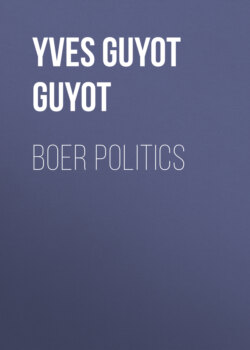Читать книгу Boer Politics - Yves Guyot Guyot - Страница 11
На сайте Литреса книга снята с продажи.
2.—The Boers, the Natives, and Slavery.
ОглавлениеDr. Kuyper's article begins with the words: "Once more the yuletide has sent forth the angelic message 'Peace on Earth,' even to where the natives gather at the humble chapels of our missionaries."
Dr. Kuyper then undertakes to show us how the Boers understand "the angelic message" in their treatment of the coloured race. He begins by waxing wroth with the English who, in 1816, in consequence of the representations of their missionaries, had instituted an enquiry as to the manner in which the Boers treated their slaves, "England humiliated them before their slaves," he says. The English also protected natives.
Dr. Kuyper says:—
"With little regard for the real rights of their ancient colonists, the English prided themselves on protecting the imaginary rights of the natives."
The italics are his own. This virtuous protester continues:—
"Deceived by the reports from their missionaries, little worthy of belief, and led astray by a sentimental love for primitive man, 'The Aborigines Protection Societies,' so drastically exposed by Edmund Burke, saw their opportunity. With their Aborigines Societies, the deists posed in the political arena as protectors of the native races, while, in religious circles, the Christians with their missionary societies posed as their benefactors."
Dr. Kuyper forgives neither the deists nor the missionaries. And what of the Boers?
"The Boers had introduced a system of slavery copied from that adopted by the English in their American colonies; but greatly modified. I do not deny that, at times, the Boers have been too harsh, and have committed excesses. …
"The Boers are not sentimentalists, but are eminently practical. They recognised that these Hottentots and Basutos were an inferior race. …
"The Boers have always resolutely faced the difficulty of the colour question so persistently kept out of view by the English."
And Dr. Kuyper goes on to speak of the multiplication of the blacks in South Africa. He dare not point to the logical solution, which would be to regulate matters by extermination, pure and simple; but he gives vent to his hatred of the English who, far from checking that multiplication, assist it by their humane treatment of the natives. He is especially wrathful with English missionaries, "those black-frocked gentlemen." He states that the Boers do their best "to keep them at a distance"; and he cites, as a fact, which fills him with indignation and alarm:—
"A coloured bishop has been appointed president of a kind of negro council in Africa."
I confine myself to quoting Dr. Kuyper. He shows too plainly the character, passions, and hatreds of the Boers, to render comment necessary. He acknowledges that the Great Trek, the emigration northwards, did not begin till after 1834, when, according to the manifesto of 1881, known as the Petition of Rights, "in consequence of the enforced sale of their slaves, the old patriarchal farmers were ruined." This document represents that it was treating them "with contumely" to offer them money compensation, adding regretfully "that the greater portion of the money remained in the hands of London swindlers." The regret and the contumely are difficult to reconcile. Ancestors of the Boers had more than once acted in a similar manner towards the Dutch East India Company when dissatisfied with their administration, and unwilling to pay their taxes. But Pro-Boers have a curious habit of magnifying things. One would imagine, to hear them speak, that every Boer in the Cape had packed wife, children, and goods into ox-wagons and had trekked north. As a matter of fact, the greater proportion remained behind, and their descendants formed the majority of the 376,000 whites enumerated in the census of 1891. The Great Trek was really composed of various detachments which started one after another in 1836. Statistics of the numbers of trekkers vary from 5,000 to 10,000. I have not been able to trace whether these figures refer only to adult males, or whether they include the women and children. In any case, when discussing South African affairs, we must always bear in mind the small number of persons concerned, in comparison with the vast extent of the area in question.
Not only these trekkers, but all who, from the period of the seventeenth century onwards, had had the tendency to wander from the Cape, belonged to the most adventurous and warlike portion of the population. They had spread themselves over an enormous tract of country, and were in close touch with kaffirs and bushmen, cattle-lifters using poisoned arrows. Living in isolated families, they acquired, in the course of their unceasing struggle with their savage neighbours, not only their qualities of daring and warlike skill, but habits of cruelty and cunning as well.
